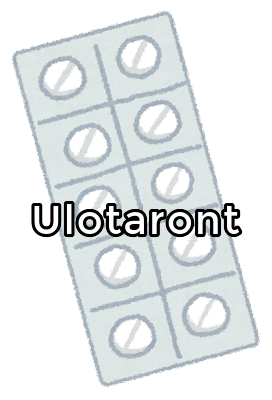Introduction
(This article is a translation of an article for Japanese readers.)
In this article, following on from (part 1), I will summarize “innovative” schizophrenia drugs that will be released in the future. I will mainly write about Ulotaront.
I will also add a few words about the high-profile Solian, Betaine, and Iclepertin (BI425809).
Click here to read about the (part1) muscarinic agonists.
Innovative Schizophrenia Drugs【Summary part 1】Muscarinic Agonists
Atypical Antipsychotics
As mentioned in the article on muscarinic agonists, the most commonly used drugs for schizophrenia today are atypical antipsychotics. Some “problems” with atypical antipsychotics include the following
- Insufficient effect on negative symptoms and cognitive dysfunction.
- Weight gain.
- Extrapyramidal symptoms.
- For 20% to 30% of patients (treatment-resistant schizophrenics), positive symptoms are not suppressed.
Ulotaront
Like muscarinic agonists, Ulotaront may solve or alleviate some of these problems.
Below, I will write about Ulotaront’s effects on negative symptoms, weight gain, extrapyramidal symptoms, treatment-resistant schizophrenia, and other psychiatric disorders.
Negative Symptoms
Ulotaront may have a greater effect on “negative symptoms” than other drugs.
In particular, long-term studies have shown a “robust improvement” effect on measures such as the BNSS and PANSS negative scales.
Perhaps Ulotaront will be more likely to act activatingly than sedatingly. You may be more likely to feel more energetic.
Looking at the data on side effects, we can see that at the beginning of taking Ulotaront, the side effect of “somnolence” is slightly more common. However, in the long term, more people experience “insomnia” than somnolence.
It may be that Ulotaront is a stimulant rather than a sedative.
Ulotaront has a serotonin 5HT1A receptor-stimulating effect. This action may enhance the stimulant effect.
Ulotaront is also being considered as an adjunctive drug for major depression. If it is effective for depression, it may also be effective for negative symptoms.

Ulotaront may be highly effective in improving negative symptoms.
When Ulotaront is launched in the US, I would like to report on the impressions of users, I would like to watch Reddit and other places to see how Ulotaront acts on patients.
We may be able to find out how well it works for negative symptoms.
Weight gain, extrapyramidal symptoms
Ulotaront has less “weight gain”. It is even less than muscarinic agonists. Some people experience “weight loss” as a side effect. Ulotaront suppresses appetite and improves metabolism.
“Extrapyramidal symptoms” were observed in only “3.3%” of patients in the phase 2 study, which is equivalent to the placebo(3.2%). We do not know if that “3.3%” was caused by Ulotaront.
So, Extrapyramidal symptoms may be almost non-existent.
Furthermore, when added (in small doses) to existing antipsychotics, Ulotaront may “alleviate” weight gain and extrapyramidal symptoms. Such effects have been seen in animal studies.

Ulotaront has very little weight gain or extrapyramidal symptoms. Rather, Ulotaront may alleviate them if added to existing antipsychotic medications.
Treatment-resistant schizophrenia
Ulotaront has a different mechanism of action than atypical antipsychotics. Drugs with different mechanisms of action may be able to “potentiate” efficacy when used in combination. Such effects have been observed in animal studies.
People whose symptoms are not adequately controlled by atypical antipsychotics alone or who have treatment-resistant schizophrenia may be able to improve their symptoms by adding Ulotaront.

Used in conjunction with atypical antipsychotics, Ulotaront may improve symptoms in patients who are not responding adequately to medications.
Other effects
Ulotaront has been shown to improve “cognitive function” in monkey experiments.
It has also been shown in animal studies to have antidepressant and antisocial anxiety disorder effects, to treat drug dependence, and to promote alertness during the day.

Ulotaront has a variety of positive effects and has the potential to improve various symptoms.
Development Status
Ulotaront is targeted for launch in the U.S. in 2024.
Summary of Ulotaront
- May be highly effective in treating negative symptoms.
- May cause little weight gain and extrapyramidal symptoms.
- May improve symptoms when added to patients who are not responding adequately to atypical antipsychotics.
- There may be some benefit when added to existing antipsychotics.
- May be able to treat a variety of psychiatric disorders other than schizophrenia.
Sorian (LB-102)
Sorian is the second most effective drug so far, after clozapine. It is more effective than olanzapine and risperidone. In particular, its effect on positive symptoms is quite high.
The drug is not yet available in Japan and the United States. LB-102, the improved version of Sorian, is being developed in the United States.
LB-102 reaches the brain more easily than Solian and requires a smaller dose. Therefore, hyperprolactinemia is reduced. And, a single daily dose is sufficient.
When used in low doses, it is particularly effective in improving depression and negative symptoms.
This drug also has a low sedative effect and is a stimulant. It often causes insomnia, and other sedating drugs may be needed.
Weight gain and extrapyramidal symptoms are common and may occur in some patients.
Some said that a Phase 2 trial of LB-102 was scheduled to begin in the first half of 2022, but the Phase 2 trial has not yet begun.

Sorian is second only to clozapine in efficacy. LB-102, a modified version of Solian, has reduced hyperprolactinemia. but weight gain and extrapyramidal symptoms are common.
Betaine
Betaine, like pyridoxamine, is a carbonyl stress reliever.
It is said that some treatment-resistant schizophrenics have increased carbonyl stress. So, treatment-resistant people may benefit from betaine.
Betaine is a “natural substance” that is widely found in seafood and plants. It is said to have not so many side effects, so perhaps in the future, it could be casually prescribed as an “adjuvant” drug. Betaine also has anti-inflammatory and neuroprotective effects on the brain.
The University of Tokyo Hospital conducted a clinical trial of betaine and it seems to have worked. It significantly improved positive symptoms.
It was said that if the clinical trial at the University of Tokyo Hospital was successful, they were going to proceed with the development plan.
I hope that the development will begin soon.

Betaine may be especially effective for treatment-resistant schizophrenia. I think it may also work for normal patients. I am not sure, but I think Betaine may be aiming for an indication as an “adjunct” to other antipsychotics.
Iclepertin (BI425809)
Although not an antipsychotic, Iclepertin (BI425809) is being developed for the treatment of cognitive dysfunction. It is in Phase 3 trials in the U.S. and is relatively close to being launched.
In the U.S., it has been designated as a “breakthrough therapy” by the FDA. It is a glycine transporter 1 inhibitor.
Although it may not be extremely effective, it is said to improve working memory particularly well.
I am very excited about this drug as the first treatment for cognitive dysfunction.

Until now, clinical trials for drugs to treat cognitive dysfunction have not been successful. I think it will be great if Iclepertin makes it to market.
Comment
Ulotaront has the potential to solve or alleviate some of the problems that atypical antipsychotics have. I hope it will be an innovative drug.
Related articles.
Innovative Schizophrenia Drugs【Summary part 1】Muscarinic Agonists
【Ulotaront part 1】Promising TAAR1 agonist
【Ulotaront part 2】Phase 2 trial was successful. / Clinical Trial Data
A lot of benefits of taking【Ulotaront】: A new antipsychotic drug
【Ulotaront】U.S. Phase 3 Studies Failed. What’s Next? / Clinical Trial Data
[democracy id=”87″]References
- https://www.mdpi.com/1420-3049/27/8/2550/htm
- https://www.nature.com/articles/mp201257
- https://www.ncbi.nlm.nih.gov/pmc/articles/PMC8704992/#B74-ijms-22-13185
- https://pubmed.ncbi.nlm.nih.gov/28723415/
